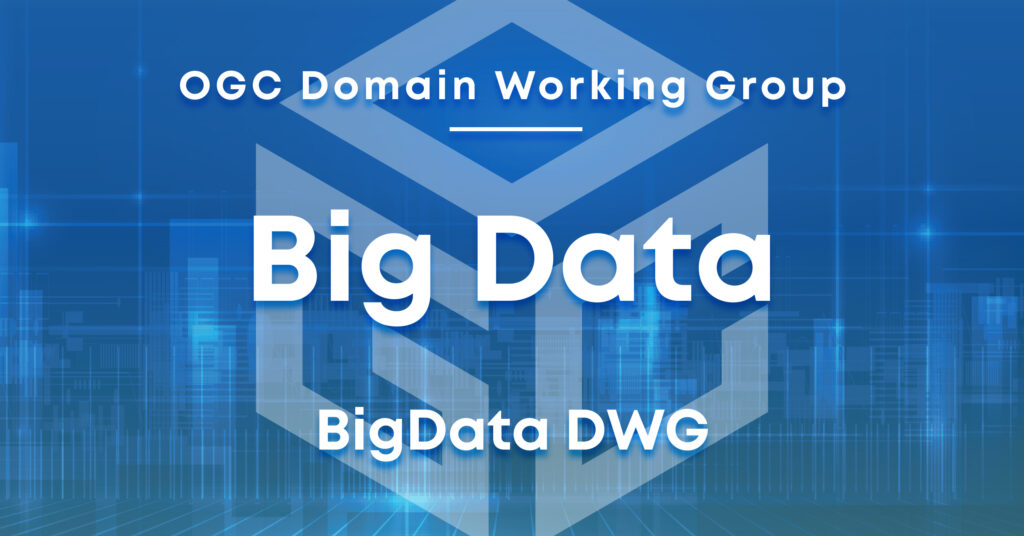OGC announces Christy Monaco as new Chief Operating Officer
As OGC’s COO, Christy will use her experience with federal agencies, partnership-building, event management, and member success to help grow and shape the Consortium.

The OGC Big Data DWG is an open forum for work on Big Data interoperability, access, and especially analytics. The DWG encourages collaborative development among participants representing many organizations and communities, and ensures appropriate liaisons to other Big Data relevant working groups, both inside and outside OGC.
The Big Data DWG is focused on spatio-temporal data, which aligns with the mission of the Open Geospatial Consortium. Recognizing the broad and somewhat nebulous definition of “Big Data,” the group provisionally adopts the term “Big Earth Data.” Within the OGC context, the DWG aims to define what Big Earth Data entails, determine its distinctive features, and identify the need for new standards to support it. Challenges that Big Earth Data may present to the OGC’s data and service interface specifications will be examined, alongside the exploration of its market value and the ways in which OGC can aid in capitalizing on this value. The DWG also intends to investigate potential alliances, both for-profit and non-profit, that could support the mission of the OGC. Furthermore, the Big Data DWG plans to elucidate foundational terminology related to data analytics, distinguishing and finding common ground with concepts like data analysis and data mining. The group will establish a systematic classification for analysis algorithms, analytics tools, data and resource characteristics, and scientific queries to further the understanding and practical application of Big Earth Data within the geospatial community.
The term “Big Data” was initially conceptualized by Doug McLaney and IBM to describe datasets that are vast, complex, and rapidly expanding across various dimensions, commonly referred to as the four Vs: Volume, Velocity, Variety, and Veracity. Volume represents the immense quantities of data stored, Velocity indicates the speed at which new data is generated, Variety encompasses the diverse range of data formats, structures, and types, and Veracity denotes the reliability and origin of the data. Over time, the scope of Big Data has broadened to include additional aspects such as Value, emphasizing the importance of extracting actionable insights; Verisimilitude, highlighting the accuracy of the data in representing reality; and Visualization, which is crucial for interpreting complex data sets.
As the Big Data paradigm continues to evolve, it poses a fundamental challenge: the need for rapid and flexible analytics. Global initiatives in Big Data visualization, analytics, and tool development are shaping the fields of science, industry, government, and society, driving significant investments in both financial and human capital. In this dynamic environment, the Open Geospatial Consortium (OGC) plays a pivotal role. Given that geospatial and location-based data are significant contributors to the Big Data ecosystem, the OGC is tasked with making authoritative statements and providing guidance on the application of OGC standards. These standards are increasingly vital as machine-to-machine communication escalates, making interoperability an essential factor for efficient operation. Consequently, the OGC is compelled to articulate a comprehensive stance that encompasses a spectrum of concerns, from scientific research and practical implementation to assessing market value and societal impact, ensuring that Big Data’s potential is harnessed effectively and responsibly.
The DWG has outlined several foundational activities to advance its mission. First, it plans to establish a robust communication infrastructure, which includes setting up a public wiki to facilitate open dialogue and resource sharing. Regular meetings are scheduled to occur during the Technical Committee (TC) assemblies and through teleconferences to maintain momentum and collaboration. The BigData.DWG is committed to fostering a dynamic and member-driven agenda, encouraging active participation and the free flow of information and insights. This approach is complemented by a proactive stance on publishing discussions and findings, utilizing the wiki and other suitable platforms. As the group evolves, it remains open to identifying and embracing additional activities that support its objectives in the realm of Big Data.
The group intends to form and sustain liaisons with relevant OGC Working Groups, such as the WCS.SWG, ensuring ongoing exchange and alignment of efforts. Similarly, partnerships with external organizations, like the Research Data Alliance (RDA), US NIST, ISO TC211, and ISO JTC1/SC32, will be pursued to broaden its scope and impact.
Working Group Chairs: Peter Baumann ( Constructor University Bremen gGmbH), Charles Heazel, and John Herring.
Receive the latest news on OGC.
© 2024 Open Geospatial Consortium. All Rights Reserved.